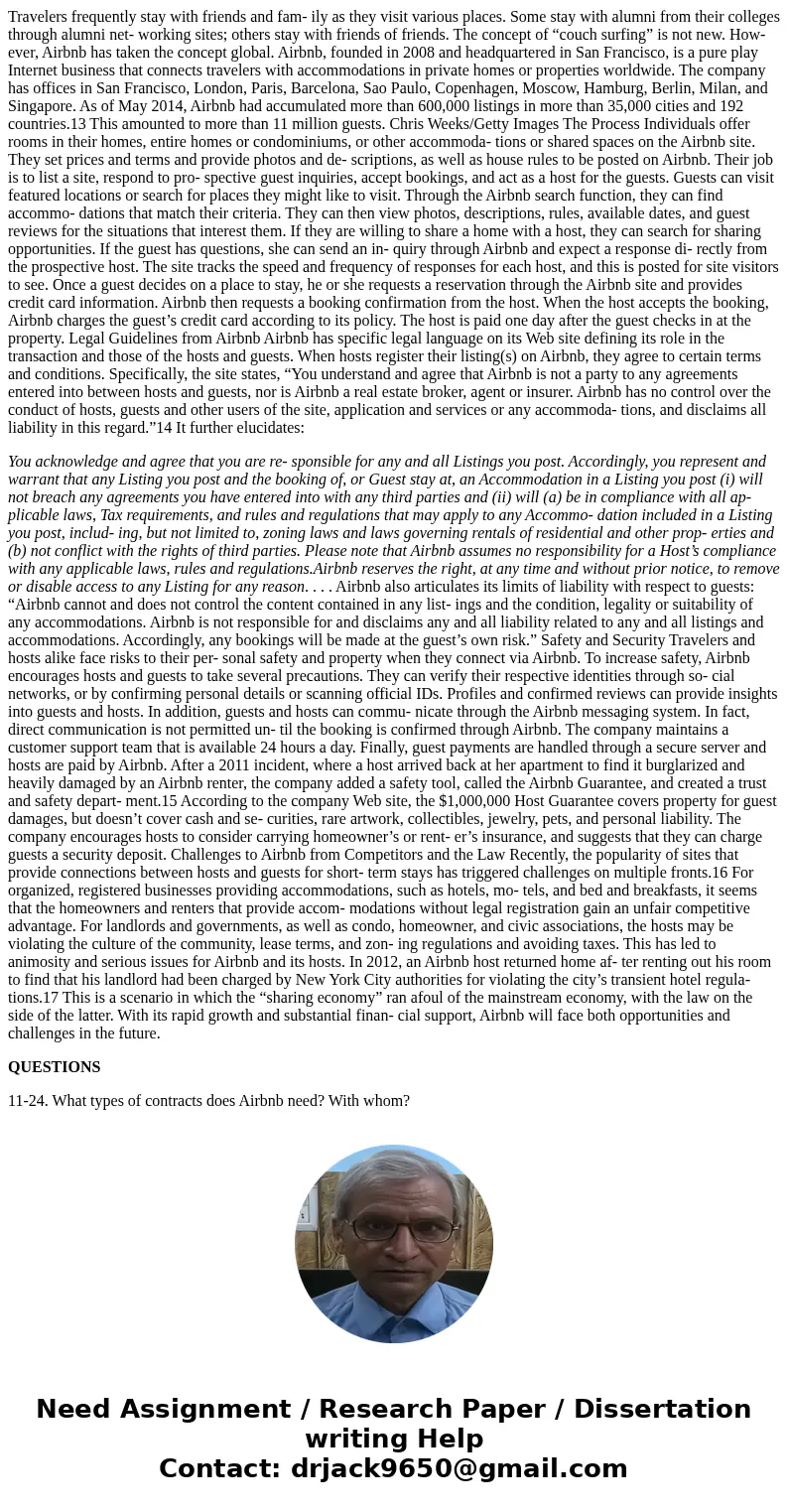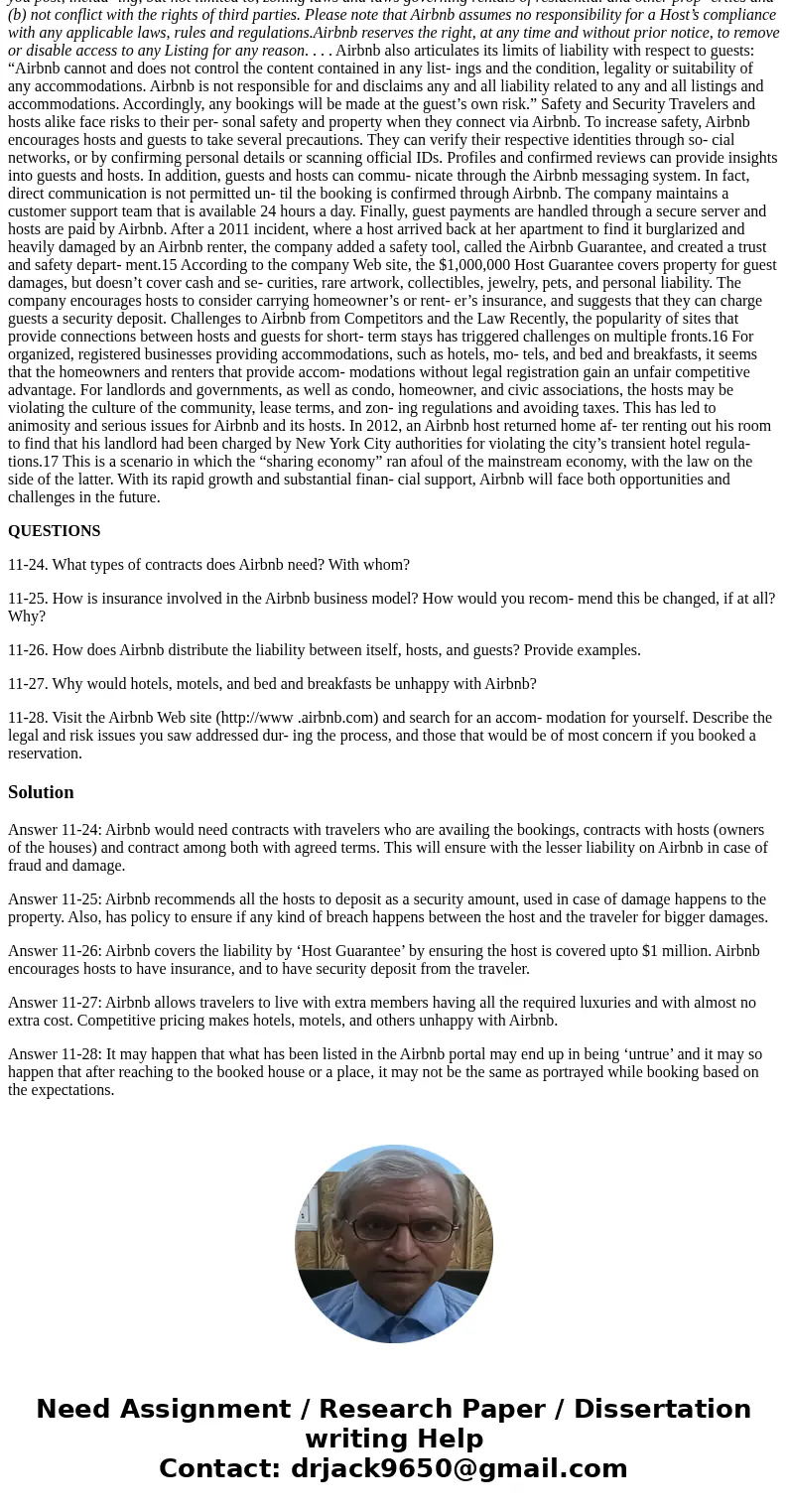Travelers frequently stay with friends and fam ily as they v
Travelers frequently stay with friends and fam- ily as they visit various places. Some stay with alumni from their colleges through alumni net- working sites; others stay with friends of friends. The concept of “couch surfing” is not new. How- ever, Airbnb has taken the concept global. Airbnb, founded in 2008 and headquartered in San Francisco, is a pure play Internet business that connects travelers with accommodations in private homes or properties worldwide. The company has offices in San Francisco, London, Paris, Barcelona, Sao Paulo, Copenhagen, Moscow, Hamburg, Berlin, Milan, and Singapore. As of May 2014, Airbnb had accumulated more than 600,000 listings in more than 35,000 cities and 192 countries.13 This amounted to more than 11 million guests. Chris Weeks/Getty Images The Process Individuals offer rooms in their homes, entire homes or condominiums, or other accommoda- tions or shared spaces on the Airbnb site. They set prices and terms and provide photos and de- scriptions, as well as house rules to be posted on Airbnb. Their job is to list a site, respond to pro- spective guest inquiries, accept bookings, and act as a host for the guests. Guests can visit featured locations or search for places they might like to visit. Through the Airbnb search function, they can find accommo- dations that match their criteria. They can then view photos, descriptions, rules, available dates, and guest reviews for the situations that interest them. If they are willing to share a home with a host, they can search for sharing opportunities. If the guest has questions, she can send an in- quiry through Airbnb and expect a response di- rectly from the prospective host. The site tracks the speed and frequency of responses for each host, and this is posted for site visitors to see. Once a guest decides on a place to stay, he or she requests a reservation through the Airbnb site and provides credit card information. Airbnb then requests a booking confirmation from the host. When the host accepts the booking, Airbnb charges the guest’s credit card according to its policy. The host is paid one day after the guest checks in at the property. Legal Guidelines from Airbnb Airbnb has specific legal language on its Web site defining its role in the transaction and those of the hosts and guests. When hosts register their listing(s) on Airbnb, they agree to certain terms and conditions. Specifically, the site states, “You understand and agree that Airbnb is not a party to any agreements entered into between hosts and guests, nor is Airbnb a real estate broker, agent or insurer. Airbnb has no control over the conduct of hosts, guests and other users of the site, application and services or any accommoda- tions, and disclaims all liability in this regard.”14 It further elucidates:
You acknowledge and agree that you are re- sponsible for any and all Listings you post. Accordingly, you represent and warrant that any Listing you post and the booking of, or Guest stay at, an Accommodation in a Listing you post (i) will not breach any agreements you have entered into with any third parties and (ii) will (a) be in compliance with all ap- plicable laws, Tax requirements, and rules and regulations that may apply to any Accommo- dation included in a Listing you post, includ- ing, but not limited to, zoning laws and laws governing rentals of residential and other prop- erties and (b) not conflict with the rights of third parties. Please note that Airbnb assumes no responsibility for a Host’s compliance with any applicable laws, rules and regulations.Airbnb reserves the right, at any time and without prior notice, to remove or disable access to any Listing for any reason. . . . Airbnb also articulates its limits of liability with respect to guests: “Airbnb cannot and does not control the content contained in any list- ings and the condition, legality or suitability of any accommodations. Airbnb is not responsible for and disclaims any and all liability related to any and all listings and accommodations. Accordingly, any bookings will be made at the guest’s own risk.” Safety and Security Travelers and hosts alike face risks to their per- sonal safety and property when they connect via Airbnb. To increase safety, Airbnb encourages hosts and guests to take several precautions. They can verify their respective identities through so- cial networks, or by confirming personal details or scanning official IDs. Profiles and confirmed reviews can provide insights into guests and hosts. In addition, guests and hosts can commu- nicate through the Airbnb messaging system. In fact, direct communication is not permitted un- til the booking is confirmed through Airbnb. The company maintains a customer support team that is available 24 hours a day. Finally, guest payments are handled through a secure server and hosts are paid by Airbnb. After a 2011 incident, where a host arrived back at her apartment to find it burglarized and heavily damaged by an Airbnb renter, the company added a safety tool, called the Airbnb Guarantee, and created a trust and safety depart- ment.15 According to the company Web site, the $1,000,000 Host Guarantee covers property for guest damages, but doesn’t cover cash and se- curities, rare artwork, collectibles, jewelry, pets, and personal liability. The company encourages hosts to consider carrying homeowner’s or rent- er’s insurance, and suggests that they can charge guests a security deposit. Challenges to Airbnb from Competitors and the Law Recently, the popularity of sites that provide connections between hosts and guests for short- term stays has triggered challenges on multiple fronts.16 For organized, registered businesses providing accommodations, such as hotels, mo- tels, and bed and breakfasts, it seems that the homeowners and renters that provide accom- modations without legal registration gain an unfair competitive advantage. For landlords and governments, as well as condo, homeowner, and civic associations, the hosts may be violating the culture of the community, lease terms, and zon- ing regulations and avoiding taxes. This has led to animosity and serious issues for Airbnb and its hosts. In 2012, an Airbnb host returned home af- ter renting out his room to find that his landlord had been charged by New York City authorities for violating the city’s transient hotel regula- tions.17 This is a scenario in which the “sharing economy” ran afoul of the mainstream economy, with the law on the side of the latter. With its rapid growth and substantial finan- cial support, Airbnb will face both opportunities and challenges in the future.
QUESTIONS
11-24. What types of contracts does Airbnb need? With whom?
11-25. How is insurance involved in the Airbnb business model? How would you recom- mend this be changed, if at all? Why?
11-26. How does Airbnb distribute the liability between itself, hosts, and guests? Provide examples.
11-27. Why would hotels, motels, and bed and breakfasts be unhappy with Airbnb?
11-28. Visit the Airbnb Web site (http://www .airbnb.com) and search for an accom- modation for yourself. Describe the legal and risk issues you saw addressed dur- ing the process, and those that would be of most concern if you booked a reservation.
Solution
Answer 11-24: Airbnb would need contracts with travelers who are availing the bookings, contracts with hosts (owners of the houses) and contract among both with agreed terms. This will ensure with the lesser liability on Airbnb in case of fraud and damage.
Answer 11-25: Airbnb recommends all the hosts to deposit as a security amount, used in case of damage happens to the property. Also, has policy to ensure if any kind of breach happens between the host and the traveler for bigger damages.
Answer 11-26: Airbnb covers the liability by ‘Host Guarantee’ by ensuring the host is covered upto $1 million. Airbnb encourages hosts to have insurance, and to have security deposit from the traveler.
Answer 11-27: Airbnb allows travelers to live with extra members having all the required luxuries and with almost no extra cost. Competitive pricing makes hotels, motels, and others unhappy with Airbnb.
Answer 11-28: It may happen that what has been listed in the Airbnb portal may end up in being ‘untrue’ and it may so happen that after reaching to the booked house or a place, it may not be the same as portrayed while booking based on the expectations.


 Homework Sourse
Homework Sourse